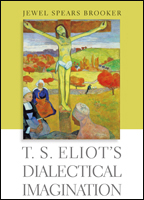
T. S. Eliot's Dialectical Imagination
Jewel Spears Brooker
John Hopkins
ISBN: 9781421426525
240 p.
49,95 $
PRÉSENTATION
The thought-tormented characters in T. S. Eliot’s early poetry are paralyzed by the gap between mind and body, thought and action. The need to address this impasse is part of what drew Eliot to philosophy, and the failure of philosophy to appease his disquiet is the reason he gave for abandoning it. In T. S. Eliot’s Dialectical Imagination, Jewel Spears Brooker argues that two of the principles that Eliot absorbed as a PhD student at Harvard and Oxford were to become permanent features of his mind, grounding his lifelong quest for wholeness and underpinning most of his subsequent poetry.
The first principle is that contradictions are best understood dialectically, by moving to perspectives that both include and transcend them. The second is that all truths exist in relation to other truths. Together or in tandem, these two principles—dialectic and relativism—constitute the basis of a continual reshaping of Eliot’s imagination. The dialectic serves as a kinetic principle, undergirding his impulse to move forward by looping back, and the relativism supports his ingrained ambivalence.
Brooker considers Eliot’s poetry in three blocks, each represented by a signature masterpiece: "The Love Song of J. Alfred Prufrock," The Waste Land, and Four Quartets. She correlates these works with stages in the poet’s intellectual and spiritual life: disjunction, ambivalence, and transcendence. Using a methodology that is both inductive—moving from texts to theories—and comparative—juxtaposing the evolution of Eliot’s mind as reflected in his philosophical prose and the evolution of style as seen in his poetry—Brooker integrates cultural and biographical contexts. The first book to read Eliot’s poems alongside all of his prose and letters, T. S. Eliot’s Dialectical Imagination will revise received readings of his mind and art, as well as of literary modernism.
JEWEL SPEARS BROOKER
Jewel Spears Brooker is emeritus professor of literature at Eckerd College in Florida. She is the author of Reading "The Waste Land": Modernism and the Limits of Interpretation and Mastery and Escape: T. S. Eliot and the Dialectic of Modernism, and the coeditor of volumes 1 and 8 of The Complete Prose of T. S. Eliot: The Critical Edition.
REVIEWS
"Brooker is among the most accomplished of Eliot scholars; her list of publications, honors, and accomplishments is staggering. This latest book is an impressively comprehensive, exhaustively researched, and refreshingly new examination of nearly Eliot's entire corpus. Opening unexpected pathways into texts that have been obscured by old, entrenched interpretations, Brooker’s analysis proves lucid, sophisticated, and insightful—a remarkably consistent and coherent book that promises to become, like her others, a permanent part of the critical canon."
— Anthony J. Cuda, author of The Passions of Modernism: Eliot, Yeats, Woolf, and Mann
"Jewel Spears Brooker excels on Eliot’s religious and moral intelligence. Here is a thinker imbued above all with Dante and the Bible. As an editor of Eliot’s multi-volume Complete Prose, Brooker is ahead in her astute use of the poet’s newly published and soon to be published words."
— Lyndall Gordon, author of The Imperfect Life of T. S. Eliot
"Jewel Spears Brooker presents with compelling clarity the primary structure of Eliot’s thought through the dialectical process in which he attempts to reconcile and transcend a succession of disjunctive contraries through his philosophical and religious studies. Drawing on years of studying Eliot’s work, and on previously inaccessible materials in new editions of his poems, prose, and letters, this book is a tour de force for the new era of Eliot scholarship. No few words known to me can pay justice to the major achievement embodied in this book."
— Ronald Schuchard, author of Eliot's Dark Angel: Intersections of Life and Art
"This is a first-rate study. Gathering up a wealth of mature learning, analysis and reflection, Brooker gives us a supremely succinct, accessible work relating the poet-critic’s earliest philosophical readings and critiques to the full span of his poetry. Fresh knowledge and insights abound, culminating in brilliant readings of Four Quartets."
— John Haffenden, editor of The Letters of T. S. Eliot
"Written with welcoming clarity and a purposeful sense of focus, this book delineates more clearly than any other how Eliot’s graduate-level study of Bradley, Bergson, and Frazer shaped his poetry and criticism throughout his life. Brooker knows Eliot’s work thoroughly and her book represents the distillation of a lifetime’s expertise."
— Robert Crawford, author of Young Eliot: From St. Louis to The Waste Land
"This book by one of Eliot’s leading scholars will be enthusiastically welcomed by different audiences. It will serve students as an authoritative, splendidly lucid guide to Eliot’s major poems. At the same time, it will renew scholars’ engagement with the poems’ philosophical underpinnings and movement. Erudite, analytically acute, exceptionally cogent."
— Jahan Ramazani, author of Poetry and Its Others: News, Prayer, Song, and the Dialogue of Genres